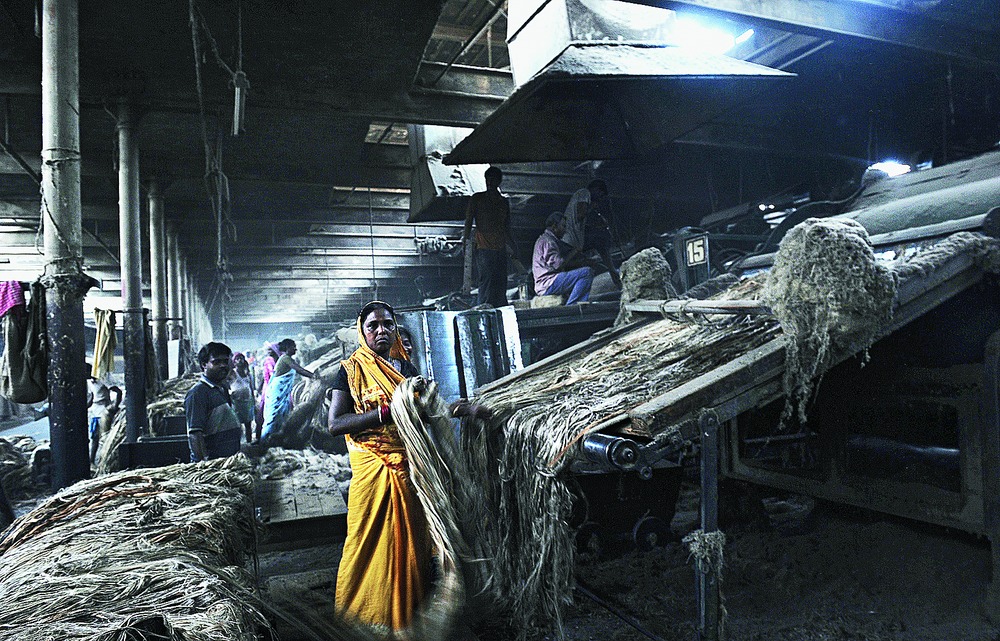
A representative photograph from AFP
She talks of the long work hours, the wages way below the mandated minimum of an apprentice even, the sight of her co-workers fighting off men grabbing their breasts like wolves.
Malar is only 19. But she has the air of a battle-scarred veteran. Her face is thin and worn. She smiles a lot, but it is not a happy smile. Her manner is accepting, but to the point of surrender.
None of it is surprising. Malar has spent close to five years as an employee of one of the many, many, spinning mills in Dindigul.
Dindigul is in south Tamil Nadu, 450 kilometres from Chennai.
Known for its forts, temples, falls and biryani, Dindigul recently made headlines when a letter written by six women workers of the local Rama Spinning Mills lay bare sordid details of sexual harassment and exploitation that goes on in this textile hub. The letter, addressed to the social welfare officer of the district, had been leaked to the media.
These anonymous six, like Malar, belong to the three lakh women working in Tamil Nadu's multi-billion dollar textile and garment industry. Dindigul itself has 70,000 women working in its mills.
The letter is not the first one has heard of Dindigul and its Dickensian mills. In 2014, a Netherlands group (the Centre for Research on Multinational Corporations and the India Committee of the Netherlands) came up with a report titled "Flawed Fabrics: The abuse of girls and women workers in the South Indian textile industry".
Says Malar, "I joined the spinning mills because I wanted to fund my schooling, help my widowed mother." This young woman, who has just completed school through correspondence, admits she tried to run away more than once.
She recalls one time when she cut her fingers on a machine and was refused medication by her supervisor. Injured and bitter she had run away, apparently through a gap in the mill wall. "But they always come to our village, coax my mother to take me back because I am good at operating machines," she adds.
The anonymous letter echoed Malar's accounts. It too had spoken about wage cuts and overtime. "It is the sexual harassment we cannot bear. It is something we cannot talk to our families about. We dread going to work every day," it had read.
Three months on, nothing has changed for these women.
"The petitioners are scared to reveal their identities. The workers have been warned and threatened by the mill management that they will lose their jobs," says Thivya Rakini of the Tamil Nadu Textile and Common Labour Union.
Rakini agrees that instances of rape, hanging and suicide attempts among mill workers are common and most of them are possibly triggered by extremely poor working conditions. "But it has been difficult to prove so far," she adds.
In June this year, teenagers Ranjitha and Pavithra tried to scale the high walls of the Eveready Spinning Mills Pvt. Ltd and, in the process, fell into a gutter on the other side, and injured themselves. According to Rakini, they were hired with the "false promise" that they would be able to study alongside their mill duties. Malar too dreams of joining college sometime soon and escaping this drudgery for good.
The district authorities and the mill managements are maintaining a stoic silence in the face of these allegations.
District collector T.G. Vinay claims an enquiry yielded nothing. "We enquired with the women [of Rama Spinning Mill], including night shift workers and it seems no such harassment has occurred," he says.
K. Venkatachalam, chief advisor to the Tamil Nadu Spinning Mills Association, which represents 600 of 1,800 mills in the state, blames NGOs, media and women mill workers. "These stories are exaggerated and untrue. It is the girls hailing from backward areas who are at fault. They live in small houses with their parents, with no privacy at all. The girls from Eveready Mills ran away because they were coerced by their parents to work there. A recent suicide attempt by a woman mill worker was also due to a lesbian affair," he says.
Is there no hope of redressal for these women? "Some mills have an internal complaints committee, but it is difficult to enforce this. There is no authority to prosecute or penalise them if they don't have one," says Venkatachalam.
A state labour department official in Chennai, who does not want to be identified, rubbishes this. "The penalty for refusing to comply with the Sexual Harassment of Women at Workplace Act is Rs 50,000. It is mandatory," says the official. "The state government can also penalise them under the Tamil Nadu Hostels and Homes for Women and Children (Regulation) Act, 2014, if they do not maintain statutory requirements like women supervisors or women security," he adds.
The official admits that "a fear factor" and "a feudalistic mindset"prevails in the mills. But, according to him, a monitoring committee under the district collector will shortly be re-notified to enquire into the rising number of sexual harassment cases in these mills.
Geetha Ramakrishnan is advisor to the Unorganised Workers Federation and the Women's Struggle Committee in Chennai. She says, "The trade union movement in Tamil Nadu was born in the textile industry in the late 40s. Today, women in the same industry toil like bonded labourers and suffer sexual harassment because they are primary earners in the family and scared of losing their jobs. Isn't it ironic?"
In a state governed by a woman leader with an iron grip, there is no one to hear the cries for help of these women. How's that for a double irony?










